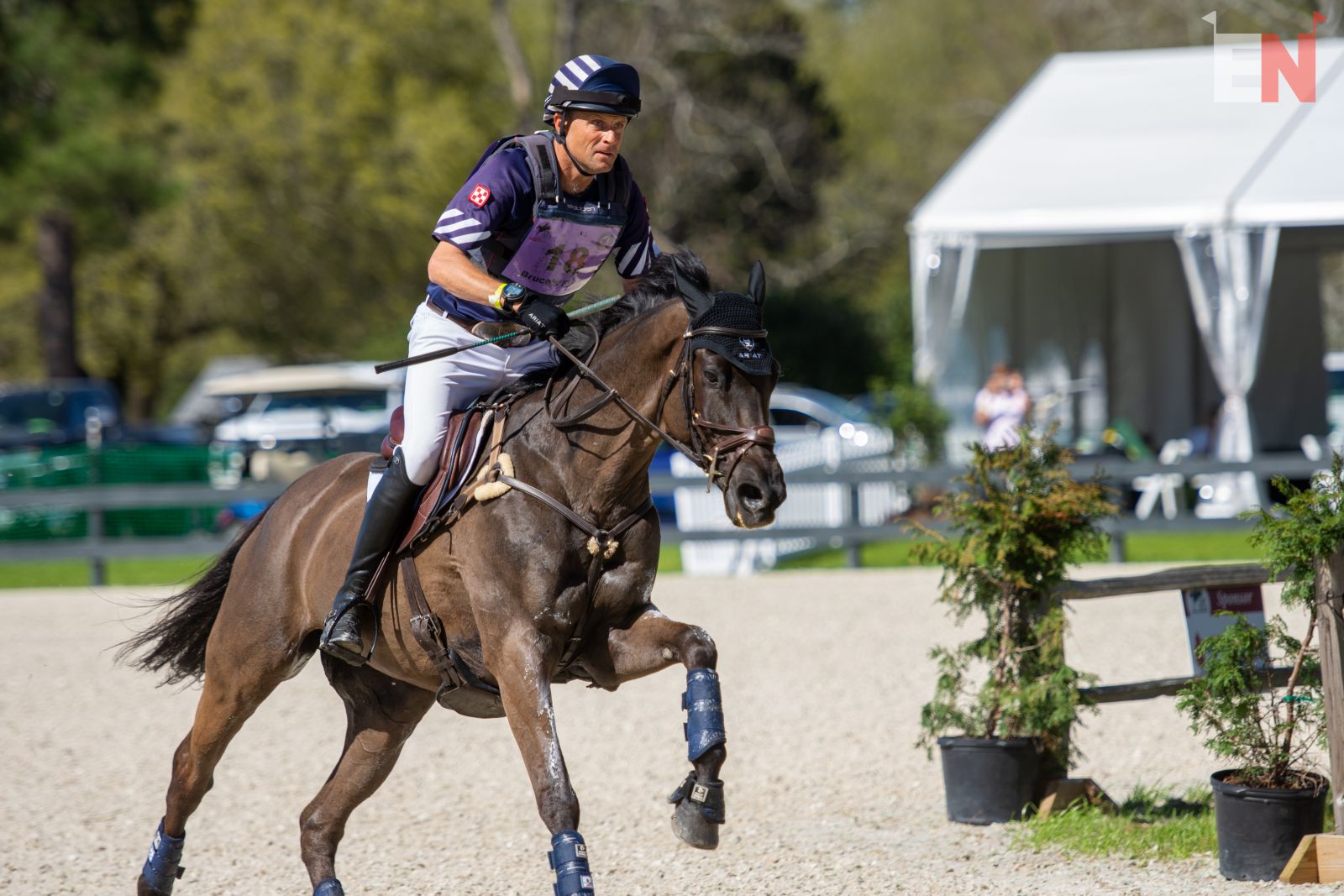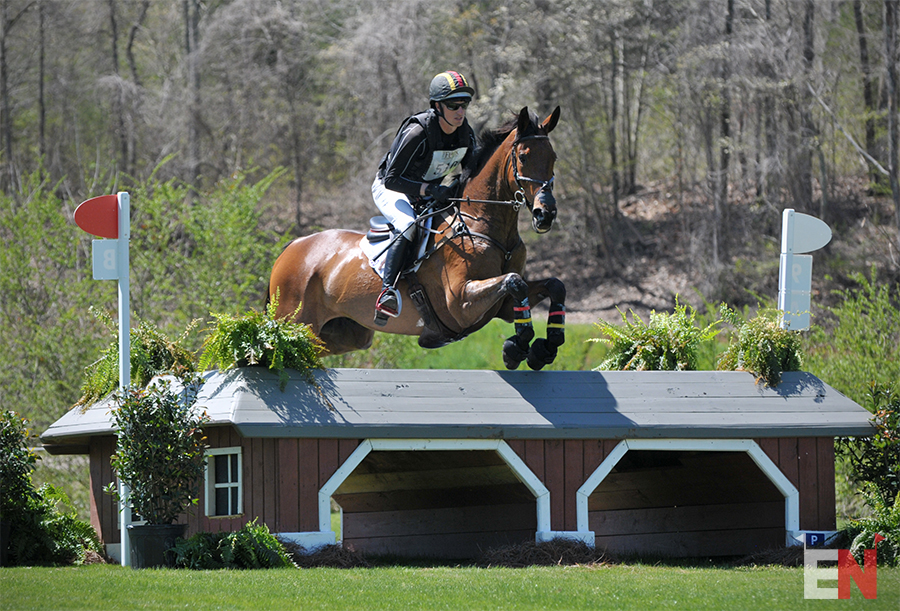
5* rider and Olympian Boyd Martin’s partner, Tsetserleg, is one horse that has had genetic testing done for suitability. Photo by Shelby Allen.
If you ask a group of eventers to write down a list of qualities that make a good event horse, there’s a good bet that a few things will show up on nearly everyone’s list.
Some of these most common traits probably pop right to the front of your mind, too: a trainable temperament, bravery, good gallop, stamina, and jumping ability with a dash of correct gaits. Your exact list may vary, but the general goal and type of horse well-suited for eventing tends to be similar.
Of course, much of our assessment of horses’ suitability is primarily visual. Do they gallop well? Do they tire easily? Do they move in a way that encourages efficient jumping and good marks in the dressage?
What if there was also a strong genetic component to many of these traits? Imagine if these genetic components could be assessed before a horse enters a sport career, or even intentionally bred from generation to generation?
This is a concept driving Etalon Equine Genetics forward.
Founded in 2013 in the heart of Silicon Valley, California, Etalon Equine Genetics provides in-depth genetic testing to help horse owners identify everything from color genes to health risks to ancestry testing. Etalon has built its products around performance-based research, discovering and developing tests for several performance traits, some of which may be of particular interest to event riders and event horse breeders.
There’s no doubt that Temperament is a very complex trait to generalize, partly because it can be influenced by many things, including the horse’s life experience, training, and environmental factors. Underneath all that, however, horses tend to have an innate, hard-wired tendency to think or react in a certain way.
Through its research, Etalon found that horses reliably displayed a predisposition in how they reacted to stimuli, leading to the development of a genetic test for it. The Temperament (DRD4) test identifies the genetic markers for Curiosity, defined in this instance as an interest in new or unknown objects and a willingness to approach them, and Vigilance, the tendency of a horse to examine its surroundings carefully and thoroughly from a distance before approaching.

Tsetserleg tested homozygous for Curiosity, which seems to match his personality in the barn: “cute and cuddly” with a friendly, outgoing temperament. Photo by Tilly Berendt.
Horses can either carry two copies of the Curiosity variant, two copies of the Vigilance variant, or one copy of each. Horses that carry two copies (aka are homozygous) for Curiosity tend to be more outgoing, and may sometimes be described as a bit “ADHD”; these are probably the horses in the barn that want more attention, are more interactive with their environment, and crave more mental stimulation.
Horses that are homozygous for Vigilance might be more reserved, choosy in whom they will and will not work with, aloof, and introspective. When frustrated, they can be aggressive or reactive, however they can demonstrate a laser focus often being compared to a working dog.
Those with a copy of each are likely to fall somewhere in the middle: they probably aren’t the “class clowns” of the barn, but they are often described as “clever” and occasionally a bit passive-aggressive (typically pushing boundaries with someone who is not “their person”) may be a bit more interested and engaged than those with two copies of Vigilance.
How do these characteristics play out in a “real life” example? In 2021, Etalon conducted a full genetic test of CCI5* horses Vandiver and Tsetserleg, both of whom were sired by the 5*-winning Trakehner stallion Windfall.
This test revealed that Vandiver is homozygous for Vigilance, while Tsetserleg is homozygous for Curiosity. This seemed to match up quite closely with how both horses behave in the barn: Vandiver has been described as “not the friendliest horse in the barn” whereas Boyd Martin has described Tsetserleg as a “cute and cuddly” barn favorite with a friendly and outgoing temperament.
While it’s clear that both personality types can make a good event horse, horses that are more strongly Curious may perform better under pressure or in a more chaotic environment, whereas horses that are more Vigilant may prefer a quieter or more predictable atmosphere. Knowing how your horse’s brain is hard-wired can potentially help you better understand their behavior and set them up for success in both training and competition.

Fellow 5* horse Vandiver, piloted by Doug Payne at the Tokyo Olympics, tested homozygous for Vigilance. Photo by Tilly Berendt.
Through years of talking through feedback from clients, Etalon has also noticed that many riders also tend to be drawn to, prefer, and get along with the same type of horse when it comes to temperament. Some riders prefer strong Curiosity, some prefer strong Vigilance, and others prefer a nice mix of the two.
Another trait that can weigh heavily on a horse’s suitability for eventing, particularly at the upper levels, is the genetic marker for endurance. Etalon offers a test for Myostatin, the gene that regulates muscle growth in horses. Natural genetic mutations on the myostatin gene cause some breeds (most commonly Thoroughbreds and Quarter Horses) to grow up to 80% more fast-twitch muscle fibers or up to 12.5% more overall muscle mass.
This gene is the difference between a horse suited more for short bursts of speed versus one better suited for long distance galloping. The Myostatin gene is closely associated with racing distance for Thoroughbreds, with horses that have two copies of the Sprint variant having more success at distances of 8 furlongs or less, whereas horses with two copies of the Endurance variant tend to excel at races of 9 furlongs or more.
Upper-level event horses would likely benefit from having two copies of the Endurance variant, giving them more natural stamina and endurance that they need for cross country. These types of horses will likely be easier to keep fit over longer distances and recover more quickly.
Indeed, in the genetic tests for Vandiver and Tsetserleg, it was discovered that both veteran CCI5* campaigners each have two copies of the Endurance gene. Not a surprise!
While it’s easy to see how these types of tests could be helpful for riders when it comes to choosing a new partner or learning more about their current horse, breeders are also taking note of the advancements in genetic testing.

Doug Payne and Vandiver. Photo by Leslie Threlkeld.
More information about breeding horses’ genetics can be of great assistance when it comes to selecting mares for a breeding program, or when looking at potential stallions to breed to.
Event horse breeder Heather Williams of Evergreen, Colorado, utilizes genetic testing in her own breeding program, and notes that the Temperament and Myostatin tests are of particular interest to her.
“I think this could make a big difference when choosing who to breed to. I would say if you’re breeding for an upper level event horse, you would want to breed two horses that both have two Endurance genes. If they both had one of each, you could end up getting offspring that does not have much endurance if they got two of the speed genes. For the temperament, if you’re looking to breed horses for amateurs, I would say you would want to be careful not to get offspring that had two Vigilance genes.”
Understanding your horse’s genetic makeup can help you determine their suitability not just for sport, but also inform the planning of training, care, and environment. Some horses may be genetically better suited towards certain disciplines, or even be better suited for certain riders and programs.
While genetic testing certainly isn’t a crystal ball, it can help give us some insight into our horse’s potential abilities and athleticism. These tests are just the tip of the iceberg when it comes to performance genetics, with new discoveries and developments happening all the time.
Who knows what else we might be able to test for some day? There will always be environmental factors as well as training and physical factors that influence a horse’s success, but it all starts in the genes.
Additional Research Citations:
- Momozawa Y et al., “Association between equine temperament and polymorphisms in dopamine D4 receptor gene.” (2005) Mamm Genome. 16: 538-44. PMID: 16151699



















